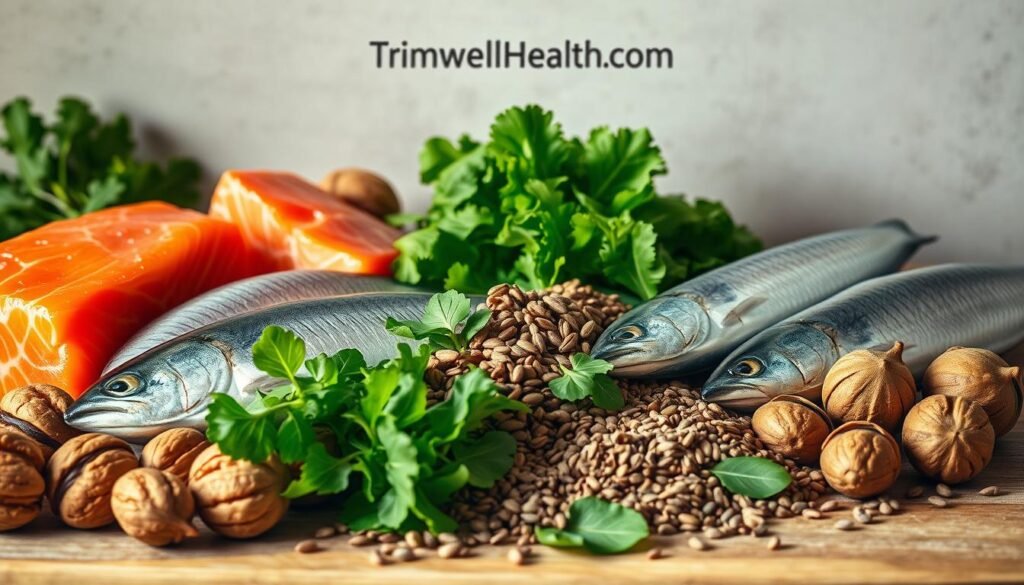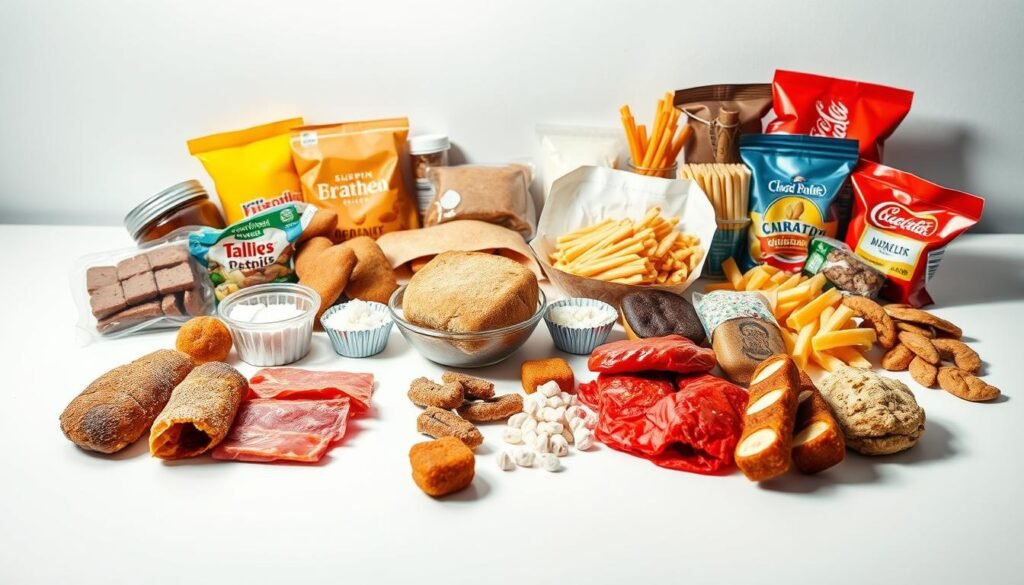Eat These Top Anti-Inflammatory Foods Daily
Last weekend, I went to the farmer’s market. I saw bright tomatoes, green broccoli, and purple berries. These colorful foods are good for us.
They make our meals taste better and help us stay healthy. Eating these foods can lower the risk of serious diseases. It’s good for our bodies and minds.
Learning about inflammation and eating right can make us healthier. For more info, check out this guide on superfoods.
Key Takeaways
- Eating anti-inflammatory foods daily helps manage inflammation.
- Fruits and vegetables are key for an anti-inflammatory diet.
- Knowing about inflammation helps us eat better.
- Eating these foods lowers the risk of chronic diseases.
- Using these ingredients in meals can improve our health.
Understanding Inflammation and Its Types
Inflammation is key to knowing how it affects our health. It’s a body guard that fights off bad stuff like germs and damaged cells. There are two main kinds: acute and chronic.
Acute vs. Chronic Inflammation
Acute inflammation is short-lived, showing signs like redness and swelling. It usually goes away fast as the body heals. But, chronic inflammation lasts a long time.
It can start from infections, autoimmune diseases, or long-term exposure to irritants. Chronic inflammation can lead to serious diseases. This makes it very important to understand and manage it.
Health Implications of Chronic Inflammation
Chronic inflammation can cause big health problems. It can make heart disease, diabetes, and cancer worse. Knowing this helps us see why we need to fight chronic inflammation.
We should look at how our lifestyle affects inflammation. This can help us stay healthier.
What Causes Inflammation?
Inflammation is a key defense in our bodies. It comes from many sources, like what we eat and our environment. Eating processed foods, added sugars, and unhealthy fats can make our bodies more inflamed.
Dietary Contributions to Inflammation
Western diets, full of bad fats and carbs, can cause more inflammation. Foods with omega-6 fatty acids, like some vegetable oils, can also trigger inflammation. Knowing which foods cause inflammation helps us eat better.
Eating whole foods like fruits and veggies can help. These foods can fight off the bad effects of inflammation. They help us stay healthy.
Environmental Factors and Lifestyle Choices
Being around toxins, like heavy metals and pollutants, can also cause inflammation. These toxins come from many places, like our homes and factories. Stress, not moving enough, and not sleeping well also make inflammation worse.
Understanding these causes helps us find ways to fight inflammation. Reducing stress and staying active can help. You can learn more about how to improve your gut health and emotional well-being here.
Top Anti-Inflammatory Foods to Eat Daily
Eating a variety of anti-inflammatory foods every day can make you healthier. These foods help lower inflammation and give you important nutrients. Foods like fatty fish, colorful fruits, veggies, and whole grains are great for fighting inflammation.
Overview of Key Food Categories
When you want to eat foods that fight inflammation, think about these main groups:
- Fatty Fish: They have omega-3 fatty acids, which are very good at fighting inflammation.
- Fruits and Vegetables: They are full of antioxidants that fight oxidative stress and inflammation.
- Whole Grains: They have lots of fiber, which can lower inflammatory markers in your body.
Examples of Specific Foods
Here are some foods that are great at fighting inflammation:
| Food | Type | Benefits |
|---|---|---|
| Salmon | Fatty Fish | High in omega-3 fatty acids, promotes heart health |
| Blueberries | Fruit | Rich in antioxidants, helps reduce oxidative stress |
| Kale | Vegetable | Contains vitamins and anti-inflammatory compounds |
| Quinoa | Whole Grain | High in fiber and protein, supports gut health |
| Avocado | Fruit | Loaded with healthy fats, enhances nutrient absorption |
Adding these foods to your meals can really help your health. You can enjoy them from breakfast to dinner.
The Role of Omega-3 Fatty Acids
Omega-3 fatty acids are key for good health and fighting inflammation. Our bodies can’t make them, so we need to eat them. Let’s look at where we can find omega-3s and their health perks.
Sources of Omega-3s
Fatty fish like salmon, mackerel, herring, and sardines are full of omega-3s. For those who like plants, flaxseeds, chia seeds, walnuts, and algae oil are great. Here’s a table showing these sources:
| Source | Type | Omega-3 Content (per 100g) |
|---|---|---|
| Salmon | Animal | 2260 mg |
| Sardines | Animal | 2200 mg |
| Flaxseeds | Plant | 22000 mg |
| Chia Seeds | Plant | 1700 mg |
| Walnuts | Plant | 10000 mg |
| Algal Oil | Plant | 360 mg |
Health Benefits Beyond Inflammation
Eating foods rich in omega-3s does more than fight inflammation. They help your heart by lowering bad fats and blood pressure. They also make your brain work better and might prevent brain diseases.
Omega-3s also help your mood, easing depression and anxiety. Adding these fats to your diet is a smart move for staying healthy.

Fruits and Vegetables That Fight Inflammation
Eating a variety of fruits and veggies is good for your health. They help fight inflammation. This section talks about the best ones to eat every day.
Fruits Rich in Antioxidants
Berries, cherries, and citrus fruits are great for reducing inflammation. They have lots of antioxidants like vitamin C and anthocyanins. Here are some examples:
- Berries (blueberries, strawberries) are full of antioxidants. They help fight oxidative stress.
- Cherries have special compounds that help reduce pain. They are anti-inflammatory.
- Oranges taste great and have vitamin C. Vitamin C is important for fighting inflammation.
Vegetables with Anti-Inflammatory Properties
Vegetables are also key in fighting inflammation. They have fiber, vitamins, and minerals that help lower inflammation. Here are some good ones to eat:
- Broccoli has sulforaphane. It may help manage inflammation and support health.
- Spinach is full of antioxidants and anti-inflammatory properties. It’s good for your body.
- Bell peppers are colorful and have compounds that reduce inflammation.
Eating a variety of colorful fruits and veggies every day is good. They give you lots of antioxidants and help fight inflammation. This makes for a healthier life.
Herbs and Spices to Include in Your Diet
Herbs and spices make food taste better and are good for you. Turmeric is special because of curcumin. It fights inflammation well.
Turmeric: The Golden Spice
Turmeric is called the golden spice for a reason. It fights inflammation, which is good for your health. You can add it to smoothies, soups, or rice.
Other Beneficial Herbs and Spices
There are more herbs like turmeric. Ginger helps with pain and inflammation. Cinnamon helps with blood sugar and inflammation too. Garlic boosts your immune system and fights inflammation.
How to Incorporate Anti-Inflammatory Foods into Your Daily Routine
Starting an anti-inflammatory diet takes creativity and planning. Try new meal ideas to make it fun. For example, salmon and greens are a tasty mix of nutrients.
Berry smoothies are quick and yummy. Whole-grain salads with colorful veggies are also great for your health.
Meal Ideas and Recipes
- Grilled salmon with sautéed kale and garlic
- Berry smoothies blended with spinach and flaxseeds
- Quinoa salad with cherry tomatoes, bell peppers, and avocados
- Chickpea curry with turmeric and spinach served over brown rice
Practical Tips for Shopping and Preparation
Choosing the right ingredients is key. Here are some shopping tips:
- Opt for seasonal produce to enjoy peak freshness and taste.
- Always read labels to avoid hidden sugars and unhealthy additives.
- Select whole grains such as brown rice, quinoa, and whole wheat.
Preparing meals ahead of time helps you eat healthy. It makes a big difference in your health.
Foods to Avoid for Reducing Inflammation
Choosing the right foods is key to fighting inflammation. Some foods can make inflammation worse. Knowing which ones to avoid helps you live healthier.
Common Inflammatory Foods
- Processed meats like bacon, hot dogs, and deli meats
- Refined sugars in soft drinks and candies
- Trans fats in fast food and baked goods
- White bread and refined flour products
- High-fructose corn syrup in sugary drinks
Healthy Alternatives to Inflammatory Foods
- Fresh fruits like blueberries, oranges, and apples
- Leafy greens, such as spinach and kale
- Whole grains like quinoa and brown rice
- Nuts and seeds, such as walnuts and flaxseeds
- Legumes like lentils and chickpeas

Conclusion
Eating foods rich in nutrients can make you healthier. Adding fruits, veggies, whole grains, and healthy fats to your meals helps. This can lower disease risks and fight chronic inflammation.
Choosing an anti-inflammatory diet is a long-term choice. It’s not just for now. It’s about making healthy food choices every day. This can make your life better and more vibrant.
Reducing inflammation and improving health starts with eating mindfully. An anti-inflammatory diet helps you take care of your health. It brings many benefits to your life.
FAQ
What are the top anti-inflammatory foods I should eat daily?
Eat foods like salmon, berries, spinach, nuts, and whole grains every day. They fight inflammation and keep you healthy.
How does chronic inflammation affect my health?
Chronic inflammation can cause heart disease, diabetes, and cancer. It’s caused by diet and lifestyle. Eating anti-inflammatory foods helps manage it.
What foods should I avoid to minimize inflammation?
Stay away from processed meats, refined sugars, and trans fats. Eat fresh fruits, veggies, and whole grains instead. They reduce inflammation.
How can I easily incorporate more anti-inflammatory foods into my meals?
Add berries to smoothies, spinach to salads, and whole grains to meals. Meal prep helps keep healthy foods ready.
Are there specific herbs and spices that help fight inflammation?
Yes! Turmeric, ginger, cinnamon, and garlic are great. They add flavor and health benefits to your food.
What role do omega-3 fatty acids play in managing inflammation?
Omega-3s are key in lowering inflammation. You find them in salmon, flaxseeds, and walnuts. They’re good for more than just fighting inflammation.
Can fruits and vegetables really help reduce inflammation?
Yes! Berries, cherries, and oranges fight inflammation with antioxidants. Broccoli and spinach lower inflammation with nutrients and fiber.
How can I create a daily anti-inflammatory diet plan?
Plan meals like grilled salmon with greens, colorful salads, or oatmeal with berries. Choose a variety of fresh ingredients.


